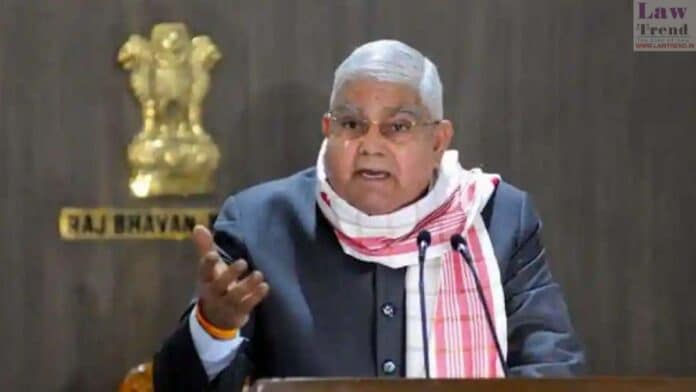Vice President Jagdeep Dhankhar on Thursday launched a sharp critique of the Supreme Court’s recent verdict mandating a timeline for the President to act on bills passed by state legislatures, calling it an instance of judicial overreach and warning against the judiciary functioning as a “super Parliament”.
Speaking at the Vice-President’s Enclave while addressing the sixth batch of Rajya Sabha interns, Dhankhar raised constitutional concerns about the Court’s April 8 judgment in State of Tamil Nadu vs. Governor, which directed timelines for the President’s assent to state bills. “There is a directive to the President by a recent judgment. Where are we heading? What is happening in the country?” he asked, cautioning against the judiciary encroaching upon executive and legislative domains.
The Vice President questioned the legitimacy of the judiciary’s authority to issue such directions, stating, “The only right you have under the Constitution is to interpret the Constitution under Article 145(3)… The judges who issued a mandamus virtually to the President… have forgotten the power of the Constitution.”
Calling for constitutional reforms, Dhankhar proposed amending Article 145(3), which deals with the composition of the Bench to decide substantial questions of constitutional law. “Five out of eight would mean interpretation will be by majority. But leave that aside. Article 142 has become a nuclear missile against democratic forces, available to judiciary 24×7,” he remarked, in a scathing reference to the Court’s power to pass orders for complete justice.
‘No Accountability if Judiciary Takes Over Executive Functions’
Referring to the larger implications of judicial directives to the President, Dhankhar said, “We have judges who will legislate, who will perform executive functions, who will act as super Parliament, and absolutely have no accountability because law of the land does not apply to them.”
He stressed the need to preserve the principle of separation of powers and questioned how accountability is ensured if judicial decisions begin to drive executive governance. “When the government is elected by people, the government is accountable to Parliament… But if this executive governance is by judiciary, how do you ask questions?” he asked.
Questions Over Judicial Immunity and Delay in Action
Raising concerns over lack of transparency in the judiciary, the Vice President made pointed remarks about a March 14-15 incident involving alleged cash discovery at the residence of sitting Delhi High Court judge Justice Yashwant Varma, now de-rostered and under inquiry. “For seven days, no one knew about it. We have to ask ourselves: is the delay explainable? Condonable?” he said, expressing dismay at the delayed disclosure and action.
Highlighting issues of judicial accountability, Dhankhar added that according to the Supreme Court’s own inputs, the case indicated “culpability”, but lamented that “no investigation under law is in progress” since no FIR has been filed. “The law says FIRs against judges cannot be registered straightaway, but this is not in the Constitution,” he asserted. “Constitution accords immunity only to the President and Governors. How come a category beyond law has secured this immunity?”
Lokpal Stay and Judicial Scrutiny
The Vice President also cited the Supreme Court’s stay on a January 27, 2025, Lokpal order authorising investigation into corruption complaints against High Court judges. “It was stayed on the ground of independence of judiciary. This independence is not a protection against enquiry, investigation, or probe,” he stressed. “Institutions thrive with transparency… The surest way to degenerate an institution is to give a total guarantee there will be no scrutiny.”
On Judicial Appointments
On the issue of judicial appointments, Dhankhar reiterated the constitutional framework under Article 124, noting, “The Constitution is clear: judges are to be appointed under Article 124 with consultation.”




